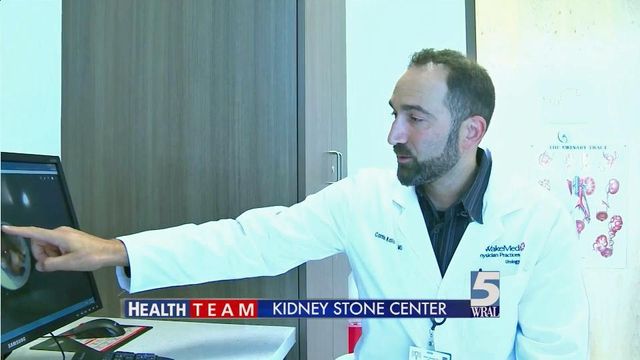WakeMed centers bust painful wait times for kidney stone care
North Carolina is known for many things, including basketball, barbecue and sweet tea. Unfortunately, the Tar Heel state also has the highest rate of kidney stones in the country.
Posted — UpdatedNorth Carolina is known for many things, including basketball, barbecue and sweet tea.
Unfortunately, the Tar Heel State also has the highest rate of kidney stones in the country.
"I just think they're cool looking," said WakeMed Urologist Dr. Carmin Kalorin. "I take lots of pictures of them. I probably have more pictures of kidney stones than anybody else on the planet."
Kalorin has images of kidney stones stuck inside the ureter, the pathway between the kidney and bladder.
"This is a stone that's been broken with a laser fiber," Kalorin said. "We're actually grabbing those pieces with a microbasket. Most patients have a stone that is passable."
Pain medications can help patients wait for the stone to pass naturally through the urinary tract.
"If the patient says, 'I'm sick and tired of dealing with this, I'm in too much pain. I want it out,' between the nine specialists in our group, one of us will be able to treat you within 24 hours," Kalorin said.
Kidney stone rates are on the rise. One in five Americans will develop a kidney stone in their lifetime. Hot temperatures along with dehydration and diet play a big role.
Patients might turn to emergency care, but they often face long waits and higher costs. That's why WakeMed specialists started a new 24/7 phone hotline and Kidney Stone Center with five locations.
"If you've ever had a kidney stone, they are excruciatingly painful, and the last thing you want is to have to wait to see the doctor who can potentially treat it or take care of it," Kalorin said.
The focus is quick assessment over the phone to rule out other possibilities like appendicitis or muscle spasm and then expedite care and treatment.
Analysis of the stone will guide nutritional counseling to reduce the risk of future stone formation.
"It saves the patients money," Kalorin said. "It saves the system, in general, money, and it saves the patients pain."
Kalorin recommends two liters of water per day. Most kidney stones consist of calcium oxalate, so a nutritionist might advise you to increase citrate in your diet, which includes lemonade, oranges and grapefruit.
Citrate will help prevent binding calcium and oxalate in the kidneys. Those patients may be advised to only slightly reduce oxalate rich foods, such as leafy greens, especially spinach. Berries, bran and nuts are just a few of the higher sources. But these are otherwise healthy foods, so the bigger focus is more fluids and more citrus fruits.
There are five locations where people can go: The Andrews Center on the WakeMed campus in Raleigh and the nearby facility on Sunnybrook Road, as well as their locations in Garner, Cary and north Raleigh.
For more information about the Kidney Stone Center, call 919-350-ROCK (7625).
• Credits
Copyright 2024 by Capitol Broadcasting Company. All rights reserved. This material may not be published, broadcast, rewritten or redistributed.





